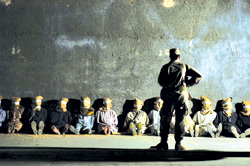“If someone had presented the concept of Gitmo in a sci-fi novel, you would have thought it was crazy Kafkaesque nonsense,” says Mat Whitecross, co-director of The Road to Guantánamo, speaking in New York during our recent sit-down at the Tribeca Film Festival. “The scary thing is that people have become used to the idea. There’s a lot of uproar initially, but after a while it fades into the background. You think, ‘Well, that’s closed now, isn’t it?'”
In fact, the infamous U.S. detention center remains open for business, though the real-life prisoners depicted in Road returned home to Britain in March 2004. The “Tipton Three” were young men from the Midlands who traveled to Pakistan shortly after 9/11, blundered into Taliban territory, and endured a two-year nightmare of imprisonment, torture, and extreme privation that began with their capture in Afghanistan by Northern Alliance soldiers and eventually led to the outdoor cages of Camp X-Ray. Alternating deftly between matter-of-fact interviews with the Tipton Three—who were eventually freed without charge—and re-enactments of their ordeal, Road chronicles what Whitecross calls “a crazy adventure that got out of control.”
Road‘s other director, the prolific Michael Winterbottom, we know from Tristram Shandy: A Cock and Bull Story, In This World, and 9 Songs. Having done second-unit work on World (in Pakistan and Iran) and edited the sexually explicit Songs, the 28-year-old Whitecross now steps up as full partner in Road, he explains. “What’s great about Michael is that he’s very keen for you not to do your job, to move on, and that’s rare. He just says, ‘You know how to use the camera, right? Then go shoot something. You know how to edit? OK, edit.’ I know loads of other people who have worked as production assistants for years and never done anything but make the tea.”
Whitecross began laying the groundwork for Road by renting a house in his hometown of Oxford, where he and the Tipton Three spent a month getting to know one another. “In terms of their motivation, you can talk about it until the cows come home,” Whitecross notes. “We know that, initially, they traveled to Pakistan because one of them was having an arranged marriage. That’s not in dispute. But while they were in Pakistan, they went over the border into Afghanistan. If you believe the U.S. government, they went over to support Al Qaeda and attack Americans. If you believe them, they went over to see a war zone and maybe to help people. They were naive, they didn’t speak the language very well, and they were Westerners, so there were a lot of sharks circling around.
“The funny thing is, a lot of people— the British and American security forces— saw them as the ‘other’ because they’re of Pakistani origin. But they’re Western kids. You see them now, and they have become religious as a result of their experience; they’ve got beards and they go to mosque and so on. So people say, ‘Ah, they’re radicals,’ but that’s not the case at all.”
Commentators have drawn parallels between the U.S. government’s post-9/11 use of extraordinary rendition of suspected terrorists and the “disappearance” tactics used during Argentina’s “Dirty War.” The comparison hits home for Whitecross: His English father and Argentine mother were living in that country at the time of the 1976 military coup, and were imprisoned for six months for harboring Uruguayan refugees.
“Tens of thousands of people were disappeared, and loads of people they knew were disappeared or tortured to death,” says Whitecross, who was born a year after his parents were released and returned to England. “My parents were lucky, because they had this lifeline to Britain. I remember show-and-tell at school: I’d bring in pictures of my mum and dad being let out of prison, and the other kids would go”—Whitecross makes an incredulous puff of sound—”‘Your parents are jailbirds?!’ So I’ve always had in the back of my mind that just because someone is imprisoned doesn’t necessarily mean that he is a bad person, or even guilty of anything.”




